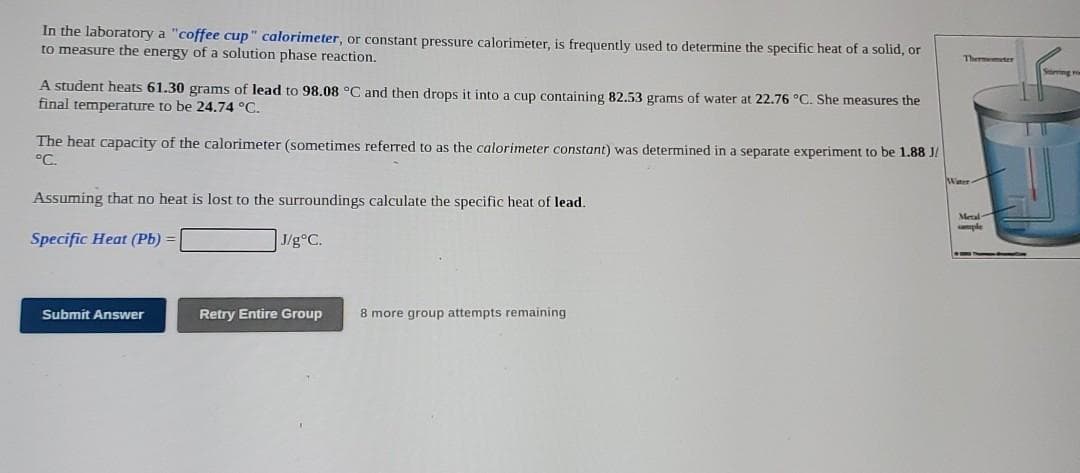A student heats 61.30 grams of lead to 98.08 °C and then drops it into a cup containing 82.53 grams of water at 22.76 °C. She measures the final temperature to be 24.74 °C. The heat capacity of the calorimeter (sometimes referred to as the calorimeter constant) was determined in a separate experiment to be 1.88 °C. Assuming that no heat is lost to the surroundings calculate the specific heat of lead. Specific Heat (Ph) =
A student heats 61.30 grams of lead to 98.08 °C and then drops it into a cup containing 82.53 grams of water at 22.76 °C. She measures the final temperature to be 24.74 °C. The heat capacity of the calorimeter (sometimes referred to as the calorimeter constant) was determined in a separate experiment to be 1.88 °C. Assuming that no heat is lost to the surroundings calculate the specific heat of lead. Specific Heat (Ph) =
Chemistry for Engineering Students
4th Edition
ISBN:9781337398909
Author:Lawrence S. Brown, Tom Holme
Publisher:Lawrence S. Brown, Tom Holme
Chapter9: Energy And Chemistry
Section: Chapter Questions
Problem 9.104PAE: 9.104 An engineer is using sodium metal as a cooling agent in a design because it has useful thermal...
Related questions
Question

Transcribed Image Text:In the laboratory a "coffee cup" calorimeter, or constant pressure calorimeter, is frequently used to determine the specific heat of a solid, or
to measure the energy of a solution phase reaction.
Thermemeter
trng o
A student heats 61.30 grams of lead to 98.08 °C and then drops it into a cup containing 82.53 grams of water at 22.76 °C. She measures the
final temperature to be 24.74 °C.
The heat capacity of the calorimeter (sometimes referred to as the calorimeter constant) was determined in a separate experiment to be 1.88 J/
°C.
Witer
Assuming that no heat is lost to the surroundings calculate the specific heat of lead.
Meal
mple
Specific Heat (Pb) =
J/g°C.
Submit Answer
Retry Entire Group
8 more group attempts remaining
Expert Solution
This question has been solved!
Explore an expertly crafted, step-by-step solution for a thorough understanding of key concepts.
This is a popular solution!
Trending now
This is a popular solution!
Step by step
Solved in 2 steps with 1 images

Knowledge Booster
Learn more about
Need a deep-dive on the concept behind this application? Look no further. Learn more about this topic, chemistry and related others by exploring similar questions and additional content below.Recommended textbooks for you

Chemistry for Engineering Students
Chemistry
ISBN:
9781337398909
Author:
Lawrence S. Brown, Tom Holme
Publisher:
Cengage Learning

Introductory Chemistry: A Foundation
Chemistry
ISBN:
9781337399425
Author:
Steven S. Zumdahl, Donald J. DeCoste
Publisher:
Cengage Learning

Chemistry
Chemistry
ISBN:
9781305957404
Author:
Steven S. Zumdahl, Susan A. Zumdahl, Donald J. DeCoste
Publisher:
Cengage Learning

Chemistry for Engineering Students
Chemistry
ISBN:
9781337398909
Author:
Lawrence S. Brown, Tom Holme
Publisher:
Cengage Learning

Introductory Chemistry: A Foundation
Chemistry
ISBN:
9781337399425
Author:
Steven S. Zumdahl, Donald J. DeCoste
Publisher:
Cengage Learning

Chemistry
Chemistry
ISBN:
9781305957404
Author:
Steven S. Zumdahl, Susan A. Zumdahl, Donald J. DeCoste
Publisher:
Cengage Learning

Chemistry: An Atoms First Approach
Chemistry
ISBN:
9781305079243
Author:
Steven S. Zumdahl, Susan A. Zumdahl
Publisher:
Cengage Learning


Chemistry: The Molecular Science
Chemistry
ISBN:
9781285199047
Author:
John W. Moore, Conrad L. Stanitski
Publisher:
Cengage Learning